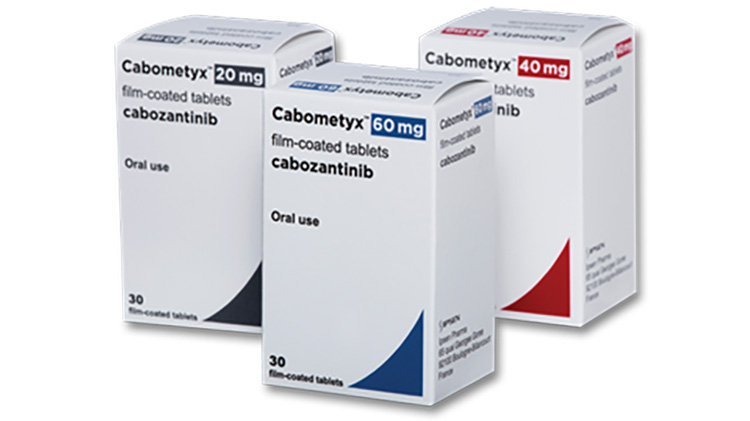Keytruda (pembrolizumab) vs Cabometyx (cabozantinib)
Keytruda (pembrolizumab) vs Cabometyx (cabozantinib)
Keytruda (pembrolizumab) is an immune checkpoint inhibitor that works by blocking the PD-1 pathway, which can help the immune system detect and fight cancer cells, and is commonly used for various types of cancer, including melanoma, non-small cell lung cancer, and head and neck cancer. Cabometyx (cabozantinib) is a tyrosine kinase inhibitor that targets multiple pathways involved in tumor growth and angiogenesis, and is used for the treatment of advanced renal cell carcinoma and hepatocellular carcinoma. When deciding between these medications, it is crucial to consider the specific type of cancer being treated, the patient's overall health, the side effect profile of each drug, and the recommendation of the oncology team, as these medications work through different mechanisms and are approved for different indications.
Difference between Keytruda and Cabometyx
| Metric | Keytruda (pembrolizumab) | Cabometyx (cabozantinib) |
|---|---|---|
| Generic name | Pembrolizumab | Cabozantinib |
| Indications | Various types of cancers including melanoma, lung cancer, head and neck cancer, cervical cancer, and others | Renal cell carcinoma, hepatocellular carcinoma, and medullary thyroid cancer |
| Mechanism of action | Programmed death receptor-1 (PD-1) blocking antibody | Tyrosine kinase inhibitor targeting MET, VEGFR, and AXL |
| Brand names | Keytruda | Cabometyx |
| Administrative route | Injection (intravenous) | Oral |
| Side effects | Fatigue, musculoskeletal pain, decreased appetite, pruritus, diarrhea, nausea, rash, pyrexia, cough, dyspnea, constipation, pain, and abdominal pain | Diarrhea, palmar-plantar erythrodysesthesia, weight decreased, fatigue, nausea, hypertension, and vomiting |
| Contraindications | Individuals with hypersensitivity to pembrolizumab or any of its excipients | Individuals with hypersensitivity to cabozantinib or any of its excipients |
| Drug class | Anti-PD-1 monoclonal antibody | Tyrosine kinase inhibitor |
| Manufacturer | Merck & Co. | Exelixis, Inc. |
Efficacy
Keytruda (Pembrolizumab) Efficacy in Kidney Cancer
Keytruda, generically known as pembrolizumab, is a checkpoint inhibitor that targets the PD-1/PD-L1 pathway, a mechanism that tumors use to evade the immune system. In the context of kidney cancer, specifically advanced renal cell carcinoma (RCC), pembrolizumab has demonstrated significant efficacy. Clinical trials, such as the KEYNOTE-426 study, have shown that when used in combination with axitinib, pembrolizumab significantly improves overall survival and progression-free survival compared to sunitinib, a standard treatment. The combination of pembrolizumab and axitinib has become a first-line treatment option for patients with advanced RCC, reflecting pembrolizumab's effectiveness in enhancing the body's immune response against kidney cancer cells.
Cabometyx (Cabozantinib) Efficacy in Kidney Cancer
Cabometyx, with the active ingredient cabozantinib, is a tyrosine kinase inhibitor that targets multiple receptors, including MET, VEGFR, and AXL, which are involved in tumor growth, angiogenesis, and metastasis. For the treatment of advanced RCC, cabozantinib has shown substantial efficacy. The METEOR trial, a pivotal phase III clinical study, demonstrated that cabozantinib significantly improved progression-free survival, overall survival, and objective response rate in patients with advanced RCC who had previously received anti-angiogenic therapy. These findings have led to the approval of cabozantinib as a second-line treatment for advanced RCC, highlighting its role in targeting pathways critical to kidney cancer progression.
Combination Therapy in Kidney Cancer
Recent studies have explored the efficacy of combining pembrolizumab and cabozantinib in the treatment of advanced RCC. The combination aims to leverage the immune-modulating effects of pembrolizumab with the anti-angiogenic and anti-tumor properties of cabozantinib. Early clinical trial results have shown promise, with the combination therapy demonstrating an improved efficacy profile over monotherapy with either drug alone. This approach is part of an evolving landscape of kidney cancer treatment, where combination regimens are increasingly being investigated to improve patient outcomes.
Conclusion on Efficacy
Both Keytruda (pembrolizumab) and Cabometyx (cabozantinib) have individually shown efficacy in the treatment of advanced renal cell carcinoma, offering improved survival outcomes compared to previous standard therapies. The potential of these drugs is further enhanced when used in combination, providing a synergistic approach that is currently under investigation. As research continues, these therapies are expected to play a central role in the management of kidney cancer, with ongoing clinical trials refining their use to maximize patient benefit.
Regulatory Agency Approvals
Keytruda
-
European Medical Agency (EMA), European Union

-
Food and Drug Administration (FDA), USA

-
Health Canada

-
Therapeutic Goods Administration (TGA), Australia

-
Medsafe (NZ)

Cabometyx
-
European Medical Agency (EMA), European Union

-
Food and Drug Administration (FDA), USA

-
Health Canada

-
Therapeutic Goods Administration (TGA), Australia

Access Keytruda or Cabometyx today
If Keytruda or Cabometyx are not approved or available in your country (e.g. due to supply issues), you can access them via Everyone.org.
How it works

Make an enquiry
Choose the medicine you want to buy, answer a couple of questions, and upload your prescription to speed things up. We’ll get back to you within 24 hours.


Make an enquiry
Choose the medicine you want to buy, answer a couple of questions, and upload your prescription to speed things up. We’ll get back to you within 24 hours.


Breeze through the paperwork
We'll guide you through the required documents for importing unapproved medicine, ensuring you have all the necessary information.


Get a personalized quote
We’ll prepare a quote for you, including medicine costs and any shipping, administrative, or import fees that may apply.


Receive your medicine
Accept the quote and we’ll handle the rest - sourcing and safely delivering your medicine.

Some text on this page has been automatically generated. Speak to your physician before you start a new treatment or medication.
Let's talk
If you have any questions, call us or send us a message through WhatsApp or email:
Contact us




